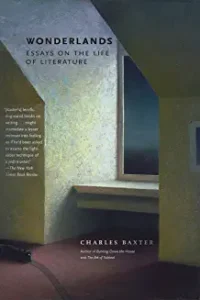Wonderlands: Essays on the Life of Literature by Charles Baxter 2022
Baxter is a ‘writer’s writer’. As is evident in his very brief Wikipedia bio, Baxter has not had a high profile literary career, but has spent his life teaching the art of writing at the University of Michigan, Iowa, and Wayne State among others while publishing a a half dozen novels and short story collections along with a handful of books about writing. He was named the winner of the PEN/Malamud Award in 2021 for his work in short stories.
This latest volume is an interesting exploration of the craft of writing fiction. As Baxter states in the introduction: “What I offer in this book is a set of essays about features in narratives that have had an obsessive grip on me: requests and lists; and hauntings; toxic subject matter and Hell; dreams and urgent narratives; and images… These topics do not yield up a set of suggestions and pieces of practical advice….The essays are often subjective and autobiographical….I have done my best in these essays to be interesting and to be as courageous as I could be in uniting the personal and impersonal, the subjective and the objective.”
This is not a book for every reader, but if you are interested in reading fine prose by a gifted writer about how great fiction works, you’ll find this book worth reading. My favorite section of the book refers to the value of fiction for the reader. Baxter writes, “….that person, me is now writing about dreams and about a world that still—with its mass murders and its unreadable, unstable leaders—seems deeply untrustworthy and still unwelcoming. But there is that portal, an escape hatch, and it’s always been there: the books that welcome you in are always there, eager to have you enter their world. Every artful story, every poem constitutes a gift of sorts, to take you into a place that is wiser and smarter and more emotional about the world than the world itself is. If you’re lucky, you enter the story and the story gives you a home.” Baxter is writing about how the discovery of reading when he was a lonely and marginalized 15 year old provided him with a life and how that life now focuses on providing that same ‘world’ to others in his fiction and in his teaching the next generation of fiction writers.
If you found his prose quoted above to be engaging, try the book. If you get past the first dozen pages (ala Dyer), you’ll find it an engaging exploration of the magic of fiction and how to create it.



